Unit 1 Friendship Direct Speech and Indirect Speech
- 格式:ppt
- 大小:6.46 MB
- 文档页数:30
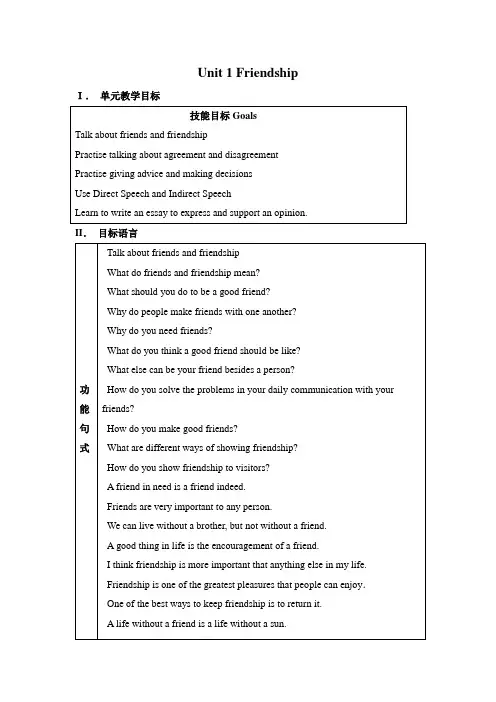
Unit 1 Friendship I.单元教学目标II.目标语言III. 教材分析和教材重组1. 教材分析本单元以Friend和Friendship为话题,旨在通过单元教学使学生通过讨论什么是好朋友,什么是真正的友谊,如何交友和保持友谊等问题,使学生树立正确的交友观。
并针对日常交友过程中经常遇到的实际问题,指导学生发表自己的见解和看法,通过进一步讨论提供有效的解决方案。
并能就此以编辑的身份写出指导信,对相关谚语写出观点明确、论证有力的短文。
1.1 Warming Up以调查问卷的形式,通过对学生在日常交友过程中所遇到的五个问题,展开调查,使学生对是否擅长交友做出评价,激发学生对本单元的中心话题产生兴趣;同时也使教师本单元的授课更具有针对性,从而有效地帮助学生树立正确的交友观。
1.2 Pre-Reading通过四个问题引导学生讨论交友的重要性以及自己心目中好朋友的概念和标准,并使学生认识到不仅人与人,人与物(如日记)也可以成为好朋友。
继续探究并树立正确交友观,并为阅读作好了准备。
1.3 Reading讲述第二次世界大战的纳粹统治时期,犹太人Anne一家过着滇沛流漓,与世隔绝的生活。
Anne在孤独中只能以日记Kitty 为友,倾诉衷肠,伴其渡过两年的逃亡生涯。
控诉了纳粹党的残暴统治给犹太人民带来了深重的灾难,并以日记的形式表达了以主人公Anne为代表的全世界人民憎恨战争渴望和平的共同心愿。
学生学习了新的词汇、句型,提高了阅读水平。
文中选用了主人公的一篇日记,使学生进一步感受到了挚友的可贵,对主人公内心世界的描写有了更深刻的理解。
1.4 Comprehension 设计了三种题型。
其中前两个是考查学生对READING文章细节内容的理解,最后一题是开放性问题,学生可以在更深入理解主人公内心世界的基础上各抒己见,使学生养成勤于思考勇于探究的良好的学习习惯,现时也培养了学生的想象力,进一步提高了阅读水平。
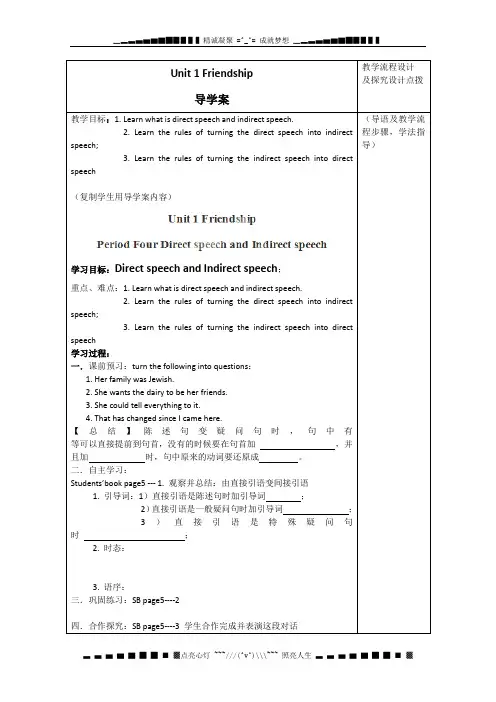
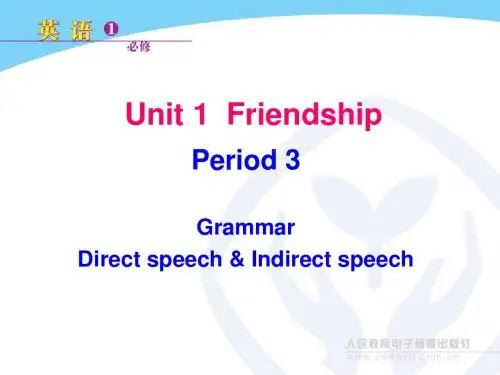
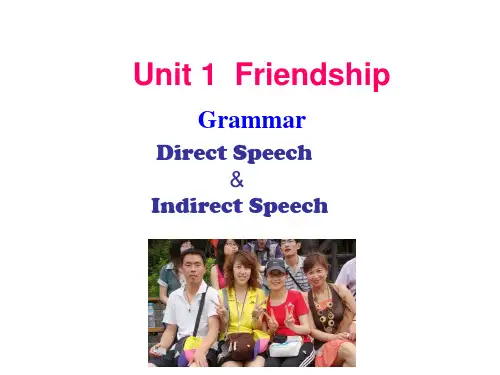
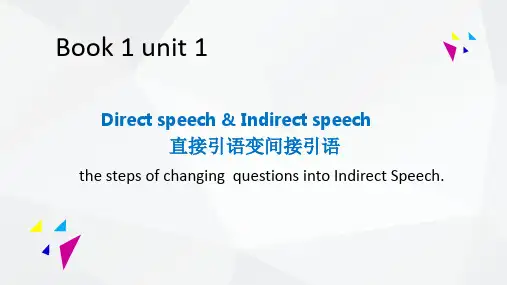

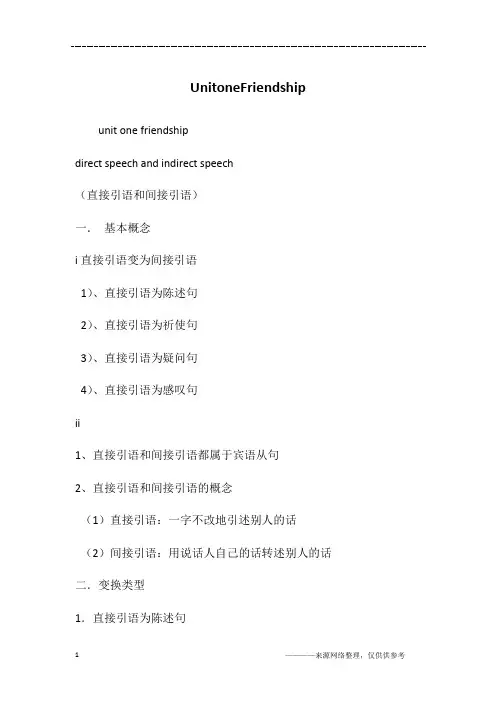
UnitoneFriendship unit one friendshipdirect speech and indirect speech(直接引语和间接引语)一.基本概念i直接引语变为间接引语1)、直接引语为陈述句2)、直接引语为祈使句3)、直接引语为疑问句4)、直接引语为感叹句ii1、直接引语和间接引语都属于宾语从句2、直接引语和间接引语的概念(1)直接引语:一字不改地引述别人的话(2)间接引语:用说话人自己的话转述别人的话二.变换类型1.直接引语为陈述句直接引语为陈述句,用that引导(口语中可以省略)。
引述动词有:say, tell等。
陈述句变间接引语要注意:1、人称的变化2、指示代词、时间状语、地点状语和动词的变化3、时态的变化4、人称的变化。
一般的规则:一随主,二随宾,三不变例如:the teacher said, “john, you must bring your book to the class. ”1> 第三者说:the teacher told john that he must bring his book to the class.2> 别人对约翰说:the teacher said that you must bring your book to the class.3> 约翰自己说:the teacher said that i must bring my book to the class. i指示代词、时间状语、地点状语和动词的变化1〉指示代词的变化this---- that these----those2〉时间状语的变化now----then ago----before today----that day yesterday----the day before; the previous day tomorrow----the next day; the following day the day before yesterday----two days before the day after tomorrow----twodays later next week/month, etc.----the next week/month, etc. last week/month, etc.---- the week/month before3〉地点状语的变化here----there4〉动词的变化come----go注:在当地转述时,here不变为there,come不变为go.在当天转述时,yesterday, tomorrow等时间状语也不变。
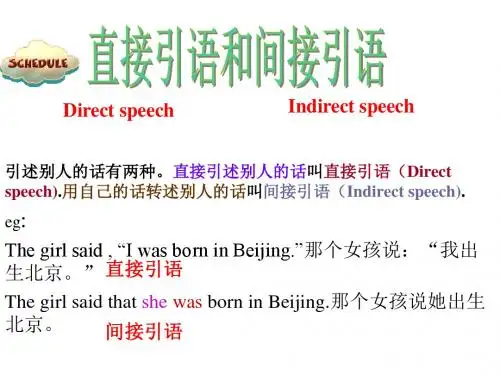
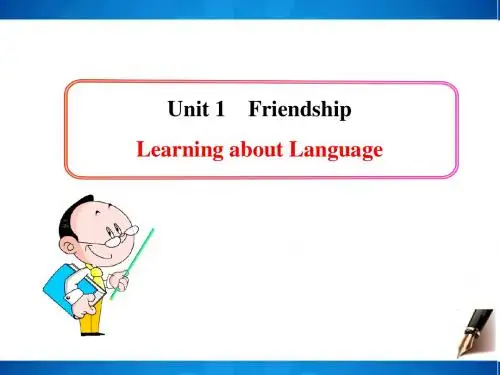
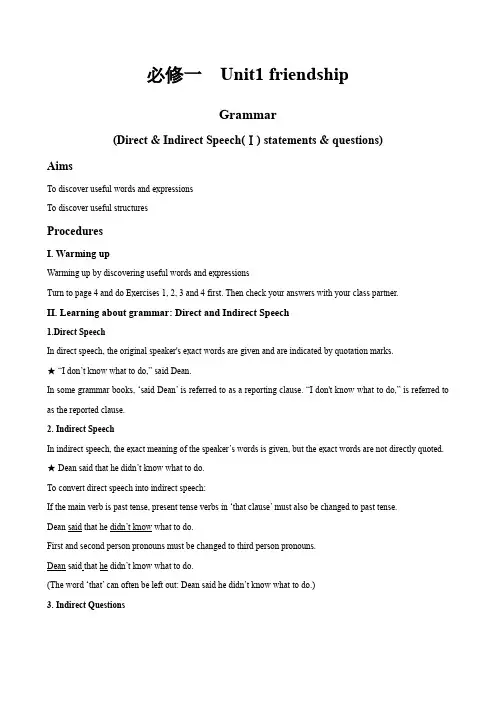
必修一Unit1 friendshipGrammar(Direct & Indirect Speech(Ⅰ) statements & questions)AimsTo discover useful words and expressionsTo discover useful structuresProceduresI. Warming upWarming up by discovering useful words and expressionsTurn to page 4 and do Exercises 1, 2, 3 and 4 first. Then check your answers with your class partner.II. Learning about grammar: Direct and Indirect Speech1.Direct SpeechIn direct speech, the original speaker's exact words are given and are indicated by quotation marks.★“I don’t know what to do,” said Dean.In some grammar books, ‘said Dean’ is referred to as a reporting clause. “I don't know what to do,” is referred to as the reported clause.2. Indirect SpeechIn indirect speech, the exact meaning of the speaker’s wo rds is given, but the exact words are not directly quoted. ★Dean said that he didn’t know what to do.To convert direct speech into indirect speech:If the main verb is past tense, present tense verbs in ‘that clause’ must also be changed to past ten se.Dean said that he didn’t know what to do.First and second person pronouns must be changed to third person pronouns.Dean said that he didn’t know what to do.(The word ‘that’ can often be left out: Dean said he didn’t know what to do.)3. Indirect QuestionsThe same rules apply to indirect questions as to indirect statements. The difference is that a wh- clause is used instead of a that clause.In telling a story or recounting events, a speaker using direct speech has all the resources of intonation to produce a lively account. Because indirect speech is always speech reported by someone else, the account is more reserved and restrained.The ability to change direct speech into indirect speech is a useful skill for those engaged in taking the minutes of a meeting or reporting on events.III. Discovering words and expressionsDo exercises 1, 2, 3 and 4 on page 4 and 5. Check your work with your partner’s.IV. Discovering structuresDo exercise 1 and 2. Check your work with your partner’s.。
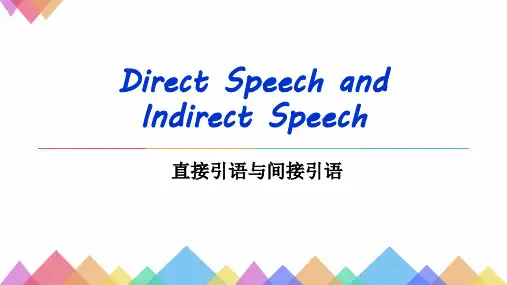
Unit 1 FriendshipPeriod 4 Grammar: Direct and Indirect Speech主备人:赵金秀审核人:高一英语组使用时间:2014年9月一学习目标:1. 掌握直接引语和间接引语之间的转换。
2. 提高学生在不同情景中运用直接引语和间接引语的能力。
3.了解并掌握宾语从句。
二学习内容:Part 1 预习自测判断下面几组句子中,哪一句是直接引语?哪一句是间接引语?他们的区别是什么?(见课本第5页)Part 2 Summary (归纳总结)Step 1 知识网络1 重点:______________________________叫做直接引语;__________________________叫做间接引语。
直接引语为陈述句、一般疑问句、特殊疑问句和祈使句时,转换为间接引语时, 在句子的___________、_____________、____________、______________和__________等方面都有变化。
(见课本第87页)2. 难点:谓语动词时态变化需要注意几点:1). 直接引语表述的是客观真理,变为间接引语时,时态不变The geography teacher said, ―The sun rises in the east and sets in the west.------The geography teacher told us that the sun rises in the east and sets in the west. 2).主句谓语动词的时态是现在时态,在引述时,时态不变。
She says, ―I’ll never forget the days in the country.‖-----She says that she’ll never forget the days in the country.Part 3 Further study(深入探究) 句式的变化A 转述他人的陈述→陈述句He said , ―I’m going to Beijing.‖→He said that he was going to Beijing.陈述句句型总结____________________________________B 转述他人的疑问→一般疑问句He asked, ―Are you a teacher?‖→He asked me if /whether I was a doctor.一般疑问句句式总结:____________________________________C 转述他人的问题→特殊疑问句She asked, ―What are you doing?‖→She asked me what I was doing.特殊疑问句句式总结:_______________________________________小练习①He said, ―I have been to the Great Wall.__________________________________________________________②He said, ―I'll give you an examination next Monday.___________________________________________________________③He said, ―Do you have any difficulty with pronunciation?___________________________________________________________④He said to me, ―What's your name?____________________________________________________⑤He asked us, ―How many car factories have been built in your country? ___________________________________________________________Part 4 Exercises (当堂检测)( )1. Tom asked Jack ______________ .A why he was so excited B. why was he so excited C. why is he so excited D. why he is so excited ( )2. ―Have you seen the film?‖he asked me. →He asked me _______.A. had I seen the filmB. have I seen the filmC. if I have seen the filmD. whether I had seen the filmA. when will he go fishingB. when he go fishingC. when he will go fishingD. when does he go fishing( )4. ―I am a teacher, ‖Jack said. →He said _________.A. that I am a teacherB. I was a teacherC. that he is a teacherD. he was a teacher( )5. He said, ―Mother, the boy is very naughty.→He _____very naughty.A. said his mother that the boy wasB. said to his mother that the boy isC. told his mother that the boy wasD. spoke to his mother that the boy is ( )6. ―You’ve already got well, haven’t you?she asked. →She asked ________.A. if I have already got well, hadn’t youB. whether I had already got wellC. have I already got wellD. had I already got well.( )7. He asked , ―Are you a Party member or a League member?‖→He asked me _________.A. am I a Party member or a League memberB. was I a Party member or a League memberC. if I was a Party member or a League memberD. whether was I a Party member or a League member.( )8. He asked, ―How are you getting along?→He asked _______.A. how am I getting alongB. how are you getting alongC. how I was getting alongD. how was I getting along( )9. He asked me ________ with me.A. what the matter isB. what the matter wasC. what’s the matterD. what was the matter( )10. Bob said _________________.A. I will never forget my visit to Yanan.B. I would never forget my visit to Yanan.C. he will never forget his visit to Yanan.D. he would never forget his visit to Yanan. 三学法指导:本单元语法教学内容是直接引语变间接引语。